Imagine traveling back in time 200 years. You could see events before you were born. The idea of time travel has always intrigued us. It makes us wonder if we can change the past and what might happen.
We’ll look into the science behind time travel. This includes the idea of a time machine and different timelines. The chance to jump through time raises big questions about time and space.
But, comes with risks and paradoxes. For example, the grandfather paradox could create a loop where killing your own grandfather is a problem. Physicist Paul Davies shows how time travel can lead to complex situations.
The post-selected model of time travel suggests strange things happen near paradoxes. Quantum theory even suggests it could lead to entering other universes. This could change the original timeline forever.
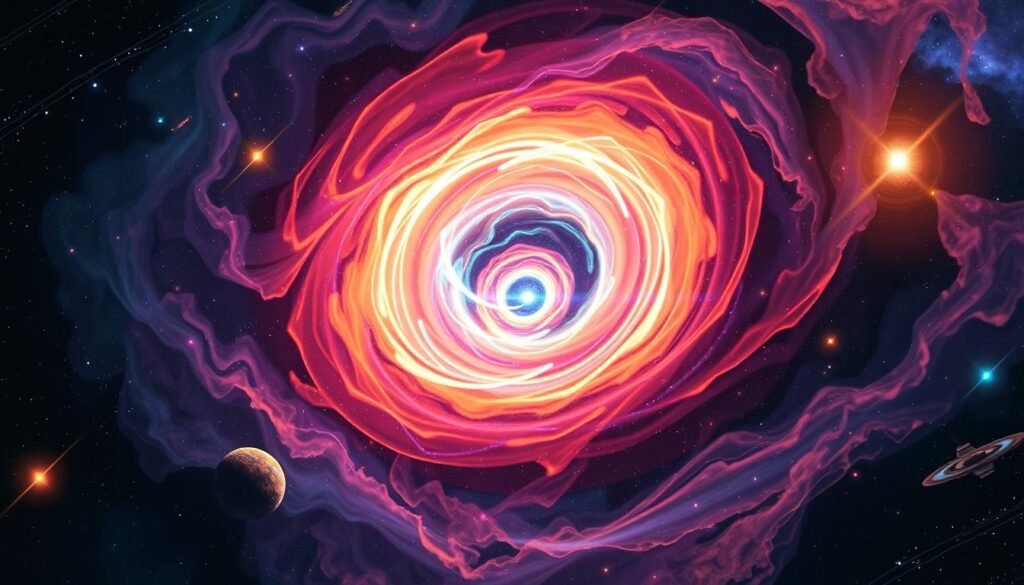
Key Takeaways
- Time travel, if possible, would require manipulating space-time in ways that are currently beyond our technological capabilities.
- The concept of a time machine and alternate timelines raises intriguing questions about the nature of time and space.
- Temporal manipulation could have significant consequences, including the potential for paradoxes and distorted probabilities.
- The post-selected model of time travel and the quantum theory propose complex and intriguing possibilities for time travel.
- Understanding the secrets of time travel requires exploring the scientific principles that underpin it, including time dilation and temporal mechanics.
- Time travel could lead to entering parallel universes, potentially altering the original timeline irreversibly.
Understanding the Fundamentals of Time Travel
Time travel, once seen as science fiction, is now a serious topic in physics and philosophy. It involves moving through time, sparking debate and research. At its heart, it’s about changing time, slowing it down, and understanding quantum physics.
Models of the universe and physics laws suggest different ways to travel through time. For example, time dilation happens when objects move fast or are in strong gravity. This makes time seem to slow down for them compared to others. This idea comes from Einstein’s theory of relativity and has been seen in real life, like with astronauts or clocks in different places.
Basic Concepts of Temporal Manipulation
Temporal manipulation means changing how time flows. This can be done by moving through time or changing its speed. Chronoportation is one way to move through time without moving in space. Another idea is time slip, where objects or people move through time without feeling time pass normally.
Grasping these ideas is key to understanding time travel. Philosophers debate how time relates to existence, with theories like eternalism, possibilism, and presentism. These ideas try to explain time’s role in our world and the universe.
The Physics Behind Time Dilation
Time dilation is a key physics concept, studied and observed a lot. It’s more noticeable in extreme places, like near black holes or at high speeds. The idea of temporal paradox also comes from time dilation, where past and future events can interact in complex ways.
Studying time travel and dilation has deepened our understanding of the universe and physics. Even though time travel is still debated, the principles of time manipulation and dilation are well-established in quantum physics.
| Concept | Description |
|---|---|
| Time Dilation | The slowing down of time due to high speeds or strong gravitational fields |
| Temporal Paradox | A situation where events in the past or future interact with each other in complex ways |
| Chronoportation | Moving through time without moving through space |
| Time Slip | Moving through time without experiencing the normal flow of time |
The Evolution of Time Travel in Scientific Theory
Time travel, once a dream of science fiction, has become a serious topic in science. The idea of temporal anomalies and causality violation has sparked a lot of debate. As we learn more about the universe, theories have become more complex.
Creating a time machine is hard because it needs special matter, like negative mass. But scientists keep looking for new ways, like using historical paradoxes. For example, the grandfather paradox makes us think about causality violation and what happens if we change the past.
Scientists like Stephen Hawking have come up with theories to tackle time travel’s problems. Hawking’s idea is that the universe stops time travel to keep things in order. Others, like Wheeler and Feynman, think that time travel won’t cause paradoxes if we add some rules.
Time travel is still a big mystery, but it’s really interesting. It has made us understand the universe better and has made us think about causality, free will, and time. As we keep researching, we might learn more about and the temporal anomalies it brings.
| Theory | Description |
|---|---|
| Chronology Protection Conjecture | The universe prevents time travel to maintain chronological consistency |
| Grandfather Paradox | A thought experiment that raises questions about causality violation and the potential consequences of altering the past |
| Time Machine Technology | The development of technology that could potentially facilitate time travel, often hindered by the need for exotic matter |
Quantum Physics and Temporal Mechanics
Researchers are diving into the mysteries of the universe. They’re looking at how quantum physics and temporal mechanics connect. The wormhole theory, which suggests shortcuts through space-time, is of great interest. It’s linked to parallel universes and how time can move differently.
Quantum mechanics is key to understanding these mysteries. It helps describe how tiny particles behave. This knowledge is vital for grasping the wormhole theory.
Quantum entanglement is a fascinating phenomenon. It’s when particles connect and can influence each other, even from far away. This has led to ideas about sending information back in time.
Quantum metrology uses quantum mechanics for precise measurements. It’s a field that’s explored the post-selective measurement technique. This method helps focus information, making it possible to keep successful teleportation for better results.
David Deutsch and Seth Lloyd have made significant contributions. They’ve proposed ways to deal with closed timelike curves (CTCs). This addresses paradoxes like the grandfather paradox.
They’ve used density matrices and state vectors to understand quantum systems. This has given us insights into theories. As we learn more about quantum physics and temporal mechanics, we might find new ways to manipulate time and space. This could lead to big breakthroughs in quantum computing and communication.
| Researcher | Contribution |
|---|---|
| David Deutsch | Proposed a method to explain how quantum systems interact with CTCs |
| Seth Lloyd | Proposed an alternative approach based on post-selection and path integrals |
Exploring Wormholes and Space-Time Bridges
Wormholes, also known as Einstein-Rosen bridges, are hypothetical tunnels through space-time. They could connect distant regions of the universe. The idea was first proposed by physicist John Wheeler in 1957.
Since then, scientists and science fiction writers have been fascinated by wormholes. They are interested in their potential for time travel and faster-than-light travel.
Theoretical analysis shows that wormholes are unstable. They would need special matter to survive turbulent conditions. If stabilized, wormholes could be practical time machines.
They would act as spatial shortcuts, making time travel possible through time dilation. This raises questions about causality and alternate realities.
Physicists like Matt Visser and Ludwig Flamm have explored wormholes. They suggest that many wormholes could exist if cosmic strings with negative mass were produced early in the universe. The existence of wormholes is still theoretical, but research continues.
While the entrance to Einstein-Rosen bridges is behind a black hole’s event horizon, it’s impossible to escape once inside. Yet, the idea of wormholes captivates scientists and science fiction writers. As we learn more about space-time and the universe, the idea of time loop and time traveler scenarios becomes more intriguing.
It sparks debates about the potential consequences of time travel and the stability of alternate realities.
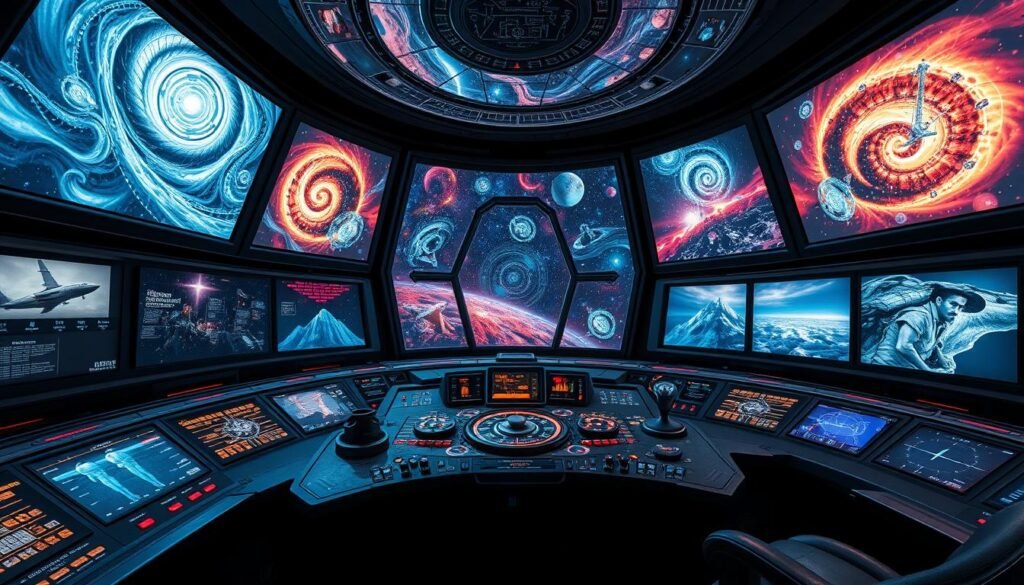
The Science Behind Time Machines
Time travel has always fascinated people, leading to many movies, books, and theories. The idea of an alternate timeline is especially captivating. Dr. Emily Carter and her team are working on a time machine prototype. They aim to explore the possibilities of changing time.
Designs for time machines often include exotic matter and energy, which are still just ideas. Building such devices requires a lot of energy and faces many challenges. For example, time dilation effects have been seen in clocks on planes and satellites compared to Earth’s clocks. This shows how theories can affect our world.
- Understanding the relationship between time and space, as posited by Einstein’s theory of relativity
- Exploring the possibilities of wormholes and space-time bridges
- Developing a deeper understanding of quantum mechanics and its implications for time travel
Time travel is still a topic of debate and speculation. Yet, scientists keep exploring the science behind time machines. As we learn more about the universe, we might find new ways to travel through time.
Temporal Paradoxes and Their Implications
Understanding temporal paradoxes is key to a good time travel theory. A , or chrononaut, must deal with the challenges of time to keep the timeline intact. There are three main types of paradoxes: bootstrap, consistency, and Newcomb’s paradox.
These paradoxes make us rethink time and cause and effect. For example, the grandfather paradox asks what happens if a kills their own grandfather. This could mean the time traveler was never born. But then, who killed the grandfather?
Other paradoxes, like the bootstrap paradox, make things exist without a clear start. This can lead to events being set in stone, making change impossible. The Novikov self-consistency principle suggests that any time travel events must be consistent and can’t create paradoxes. Yet, this idea is still up for debate.
Dealing with temporal paradoxes is crucial for to work. By grasping these paradoxes, we can better manage time travel and avoid messing with the timeline. As we learn more about time travel, we might find ways to solve these paradoxes and explore the past, present, and future.
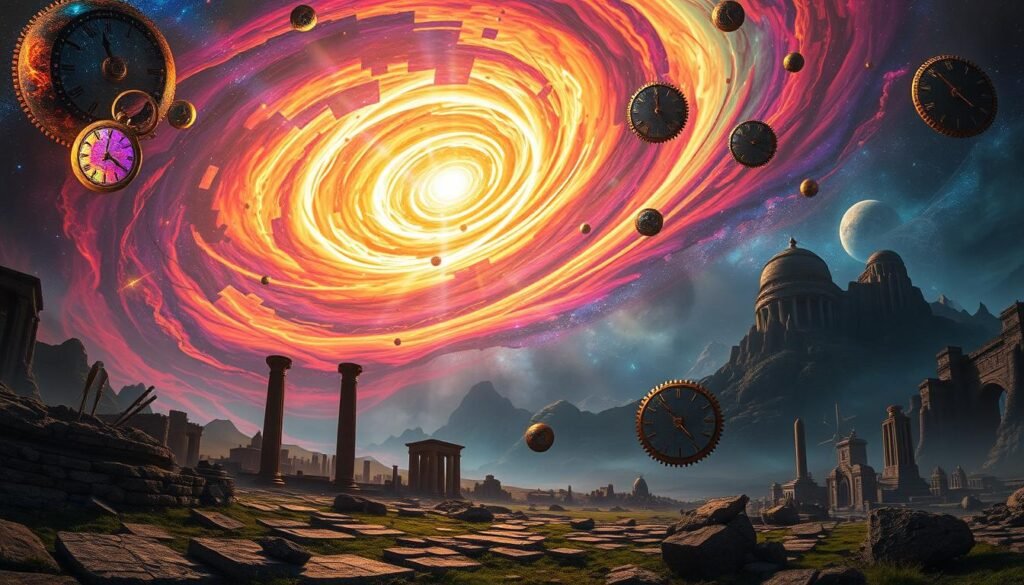
Parallel Universes and Alternative Timelines
Parallel universes and alternative timelines are big in time travel stories. They also have roots in science. The many-worlds interpretation says every choice or event makes a new universe. This leads to countless parallel worlds.
Physicist Albert Einstein’s theory of general relativity says spacetime can bend and change. This idea has led to time travel theories like wormholes and the Alcubierre drive. But, these ideas need more study to see if they work. Time travel paradoxes, like the grandfather paradox, also make us wonder about time travel’s logic.Time Travel
Key points to think about with parallel universes and timelines include:
- The many-worlds interpretation and its implications forTime Travel
- Branching realities and decision points
- Time travel paradoxes and their potential solutions
- The role of quantum mechanics in time travel theories
Scientists keep studying time travel and parallel universes. Even though time travel is still just an idea, learning about parallel universes helps us understand the universe better.
| Theory | Description |
|---|---|
| Many-Worlds Interpretation | Suggests that every decision or event creates a new universe |
| Branching Realities | Proposes that every decision or event creates a new reality |
| Time Travel Paradoxes | Raise questions about the consistency of time travel |
Historical Attempts at Time Travel
Time travel has always intrigued humans, leading to many attempts to grasp it. A time traveler is a common figure in science fiction, using a time machine to visit different times. This idea has been explored in time travel movies and time travel books.
In ancient times, myths like Hindu and Buddhist stories talked aboutTime Travel. Characters would jump forward in time or see time differently in other realms. These tales often used magical tools like mirrors and gateways to travel through time.
Early stories like “The Clock that Went Backward” by Edward Page Mitchell (1881) and H. G. Wells’ “The Time Machine” (1895) introduced time travel through machines. These stories sparked more interest in alternate realities and time travel.
As we learn more about physics and the universe, our time travel attempts grow. Scientists explore time travel through spacetime geometry and time dilation. The idea of time travel, in science fiction or science, keeps captivating us. It inspires new time travelers and explorers of alternate realities.
Modern Developments in Temporal Research
Recent studies have delved into temporal distortion, revealing more about time and space. Scientists are driven to learn more about time travel. They study quantum entanglement and search for wormholes.
Experiments now look at how time affects our memory and mental time travel. They found that time changes how we process memories. This shows how our brains handle near and far future events differently.
Breakthroughs in technology, like functional MRI and electroencephalography, help researchers. These tools let them see how our brains work with time. They help us understand quantum entanglement and its link to time.
Looking ahead, research will aim to develop new ways to study time. This includes exploring wormholes and other unusual phenomena. As we learn more about time and space, we’ll see big steps forward in temporal research.
Popular Culture’s Impact on Time Travel Theory
Time travel fiction has been a big part of popular culture since H.G. Wells introduced it in 1895 with “The Time Machine.” This idea has captivated people for ages, greatly influencing time travel theory. It’s often seen as a way to cheat death and explore immortality, even in stories.
Stories about time travel are loved because they let us explore the concept of time. This concept shapes our lives. These tales and fantasies help us gain insights or temporarily escape time’s limits. Time travel paradox and time travel theories are common in fiction. Authors use these ideas to look at what happens when we travel through time, change history, and alter timelines.
Some common ways to travel through time in stories include:
- Space and time warps inspired by the theory of general relativity
- Time slip, a popular plot device where characters travel through time by unknown means
- Communication from the future, often revolving around receiving future newspapers or messages
- Precognition, explored as a form of time travel, leading to concepts of causal loops and predestination
The idea of alternate timeline is also often explored in time travel fiction. It lets authors look at what happens when different choices are made.
In summary, popular culture has a big impact on time travel theory. Fiction often sparks scientific ideas and gets people interested in time travel.
| Time Travel Concept | Description |
|---|---|
| Time Travel Paradox | A situation where a time traveler’s actions in the past cause a logical contradiction |
| Alternate Timeline | A hypothetical timeline that diverges from the main timeline due to a time traveler’s actions |
| Time Travel Theories | Scientific hypotheses and proposals for how time travel could be achieved |
Conclusion: The Future of Time Travel Research
As we wrap up our exploration of time travel, the future looks incredibly promising. What was once seen as science fiction is now being studied by top physicists. They are looking into quantum mechanics and trying to find a “theory of everything.”
Scenarios like the Gödel scenario and Einstein scenario have sparked a lot of interest. They make us think about the possibilities of time travel. As scientists learn more about space, time, and gravity, the idea of time travel technology is becoming more real.
raises big questions about ethics and paradoxes. But, our desire to learn and explore is stronger than ever. Looking ahead, the possibilities for time travel research are endless. Each new finding brings us closer to amazing discoveries and new possibilities.
FAQ
What is time travel and how does it work?
Time travel is moving between different times. It’s a big topic in science fiction. But, the science behind it is real, based on Einstein’s theories.
What are the fundamental concepts behind time travel?
Key ideas include time paradoxes and time dilation. Also, quantum physics plays a big role. These ideas help us understand how time travel might work.
How has the scientific understanding of time travel evolved over time?
Our understanding has grown a lot. Early ideas have turned into more complex models. New discoveries in quantum mechanics and relativity have helped us understand time travel better.
What is the connection between quantum physics and time travel?
Quantum physics is key to time travel theories. Ideas like quantum entanglement help us think about wormholes and parallel universes. These could make time travel possible.
How do wormholes and space-time bridges relate to time travel?
Wormholes and space-time bridges might be shortcuts through space-time. They could help with time travel. But, making them stable is a big challenge.
What are the scientific principles behind time machine design?
Designing time machines involves space-time manipulation. We look at time dilation and energy needs. This research is still in its early stages.
What are the implications of temporal paradoxes for time travel?
Temporal paradoxes are big problems for time travel. They could cause loops or change the past. This could mess up our understanding of time.
How do parallel universes and alternative timelines relate to time travel?
Parallel universes and timelines are linked to time travel. The many-worlds theory suggests every choice creates a new world. This could make time travel safer without paradoxes.
What are some historical attempts or theories related to time travel?
Many have explored time travel over the years. From early ideas to recent theories, our interest in time has never faded. It shows our desire to grasp time’s nature.
What is the current state of temporal research?
Research in quantum physics and relativity is ongoing. Experiments with quantum entanglement and wormholes are pushing our knowledge. This work aims to understand time travel better.
How has popular culture influenced and reflected our understanding of time travel?
Time travel has fascinated us, seen in books, movies, and TV. These stories have sparked scientific ideas. They help us think about time travel’s possibilities and challenges.
Source Links
- https://science.howstuffworks.com/science-vs-myth/everyday-myths/time-travel.htm
- https://www.ebay.com/itm/353075160935
- https://iep.utm.edu/timetrav/
- https://www.livescience.com/time-travel-beginners-guide.html
- https://www.scientificamerican.com/article/is-time-travel-possible/
- https://plato.stanford.edu/entries/time-travel-phys/
- https://en.wikipedia.org/wiki/Quantum_mechanics_of_time_travel
- https://physicsworld.com/a/simulations-of-time-travel-send-quantum-metrology-back-to-the-future/
- https://www.quantamagazine.org/how-quantum-physicists-flipped-time-and-how-they-didnt-20230127/
- https://byjus.com/physics/wormhole/
- https://medium.com/@worldsimplified/exploring-the-enigmatic-world-of-wormholes-a-journey-through-time-and-space-cf4b8d3a3899
- https://www.discovermagazine.com/the-sciences/what-are-wormholes-and-could-they-be-the-answer-to-time-travel
- https://umbc.edu/stories/science-behind-potential-for-time-travel/
- https://spaceplace.nasa.gov/time-travel/en/
- https://www.bbc.com/future/article/20231110-doctor-who-is-time-travel-really-possible-heres-what-physics-says
- https://en.wikipedia.org/wiki/Temporal_paradox
- https://www.astronomytrek.com/5-bizarre-paradoxes-of-time-travel-explained/
- https://davidson.weizmann.ac.il/en/online/sciencepanorama/time-travel-paradoxes
- https://theconversation.com/time-travel-could-be-possible-but-only-with-parallel-timelines-178776
- https://medium.com/@iamkavib/time-travel-and-alternate-timelines-examining-the-concept-of-time-travel-and-the-potential-fcdb7e0a9c74
- https://www.discovermagazine.com/the-sciences/how-does-multiverse-theory-relate-to-time-travel
- https://en.wikipedia.org/wiki/Time_travel
Click here to learn more about this topic in a related article.
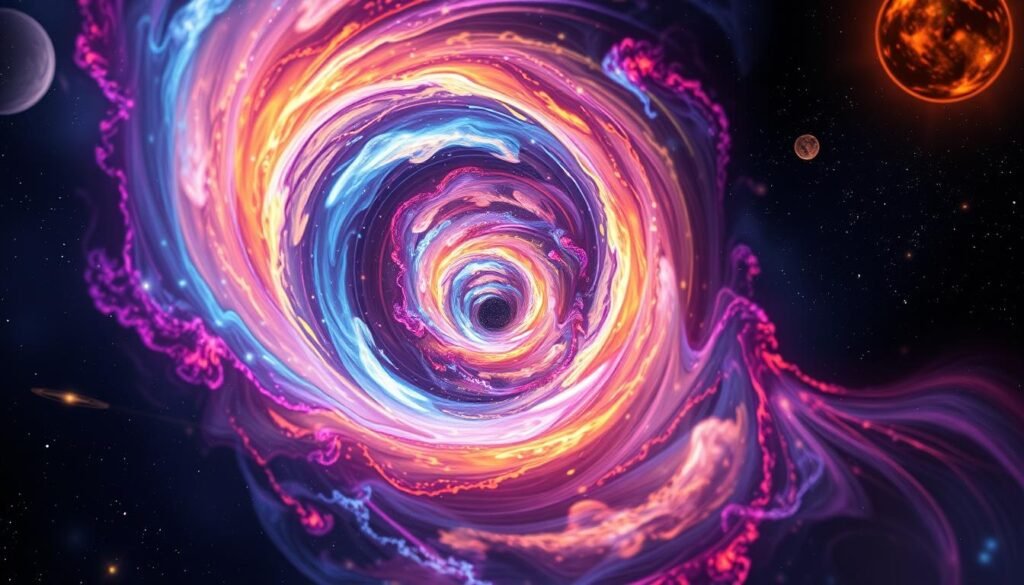
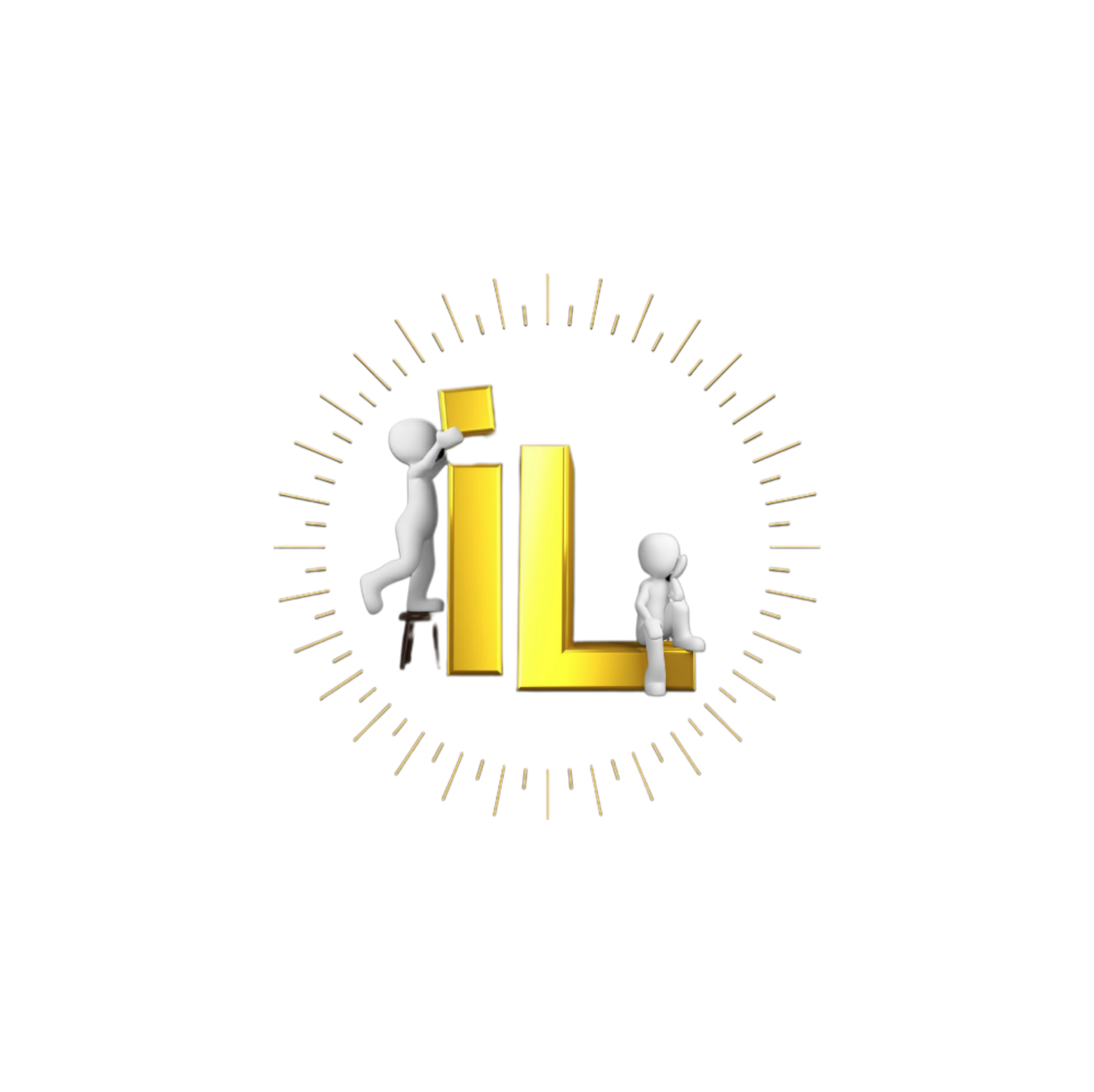
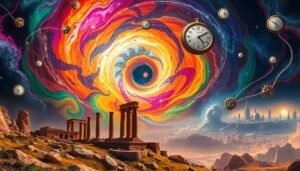


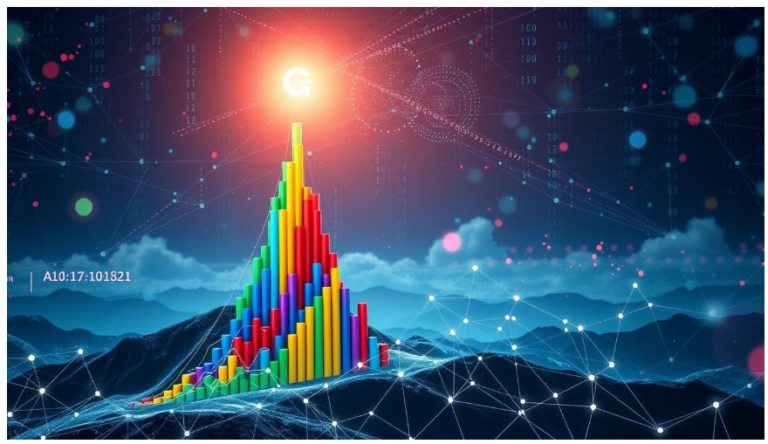
[…] Click here to learn more about this topic in a related article. […]
Thank you for your sharing. I am worried that I lack creative ideas. It is your article that makes me full of hope. Thank you. But, I have a question, can you help me?